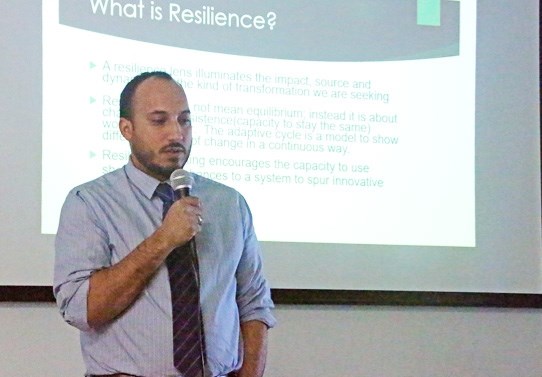Local volunteer groups met with Volunteer Alberta Ideation Director Annand Ollivierre to discuss how to bolster community support.
Board members and volunteers from the Bonnyville and District Family and Community Support Services (FCSS), Dragonfly Counselling and Support Centre (DCSC), and Bonnyville Community Health Services were among the many community members that visited the event last Tuesday at the Seniors' Drop-In Centre.
Ollivierre addressed roadblocks that appear for community organizations when time is money and wallets zip shut because of economic distress in the communities. He also listened to concerns from local organizations.
Attendees wondered about how to better engage younger generations in community activism, how to avoid becoming trapped in the same community position year after year, and how to answer possible volunteers when they ask what the experience will do for them.
“There aren't quick solutions to engaging the community,” Ollivierre explained.
He recognized that the people of the region and the volunteer groups are what make the community strong, but gathering support for any non-profit can be hard in both an economic downturn as well as an economic boom - where people seek other recreational activities that would otherwise be too costly to participate in.
One of the options that can lead to further stability as an organization is for local groups to become interdependent on each other. Ollivierre said as organizations grow, they go through stages where they eventually move into independence from the municipality, where they can fundraise and support group ventures without relying heavily on council support.
In a recession it can be hard to go back to relying on community grants, especially when many different groups suddenly are dependent on the same grants. If groups were to rely more on each other and work together, they would be better off.
DCSC Executive Director Cheryl Bujold expressed after the conference that she was looking forward to ways to have better communication between different community groups, even as the DCSC establishes itself in the community.
“All these people give their time and energy. This (gathering) helps me better help the people we serve. It brings awareness and helps us to understand,” said Bujold.
She said the gathering helped her better understand the DCSC developing place in the community, and what goals it should set moving forward.
According to Ollivierre, groups move through stages in an adaptive cycle of growth that can correspond with the economy. Phase one is moving through the struggles that come with an economic downturn, such as a sense of loss among group members. This stage allows for creativity and exploration as a group into what is and isn't working for their support initiatives in the community. Creating new initiatives and trying new programs, instead of sticking to long established and well-known community events year after year, can be a way out of a funk. It's all part of the same cycle.
“We're still experimenting, we have to stop being so hard on ourselves,” said Bujold.
The final phase sees the group mature. It creates policies and processes to repeat, but the goal for the group should be to remain flexible.
Relying on different volunteers for their different strengths is also a good way to remain a healthy organization.
“There's always someone who is an idea factory,” said Ollivierre, explaining there would be a volunteer who is better suited for every stage.
There will be someone who is good at crisis management, someone who is good at creating new ideas, someone who is best for implementing these ideas and planning - delegation is important.
“We have the possibility of losing our volunteers,” said FCSS Programmer Diahann Polege-Aulotte. “We wanted to bring organizations together. We want to work on keeping and nourishing our volunteers.”
Community group websites are a great place to get information about ways to volunteer locally. Where there might be too many options to choose from, Ollivierre recommended a fluidity between groups where community members can start at one group and then move to another and fill a different role.



